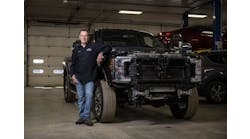Few have studied consolidation within the collision repair realm as thoroughly as Vincent Romans. The founder and CEO of The Romans Group LLC advisory firm, Romans has been immersed in the industry for more than three decades.
The longtime consultant and frequent speaker monitors industry trends exhaustively. As a result, FenderBender recently caught up with Romans in his home base of Chicago, seeking his insight about how consolidation is currently impacting the industry.
HOW HAS THE RATE OF CONSOLIDATION IN THE INDUSTRY CHANGED RECENTLY?
The velocity of change for collision repair consolidation within the U.S. collision repair industry has moderated somewhat over the past three years. The four legacy multiple location operators, MLOs [and] consolidators: ABRA, Boyd-Gerber, Caliber, and Service King [are] now the three remaining consolidators. They still remain significantly ahead of the remaining MLO’s when measured by their number of locations and total revenue.
As we entered the second half of 2019, Caliber continues to retain the number one position based on revenue, with a run rate of almost $4 billion. This appears to be one of the top years since 2014 for what was the last billion dollar MLO transaction year for MLO acquisitions by the consolidators.
One can see … the trend for the four legacy consolidators’ MLO transactions that shifted locations and revenue within the U.S. market from smaller MSOs to the legacy consolidators, with the annual average total number of locations at 191 and revenue at $572 million. The average revenue/location acquired of just under $3 million over the course of 2012 through mid-year 2019.
We expect 2019 to grow again for this top 10 segment, reinforcing consolidation among the top segments we track and analyze.
HAVE YOU NOTICED SMALL MSOs HAVE BEEN ADDING MORE LOCATIONS OF LATE?
During the last few years, before Cooks Collision was acquired by ABRA in late 2018, they did not have any noteworthy MLO acquisitions of significance. They continued their focus on maintaining and improving their performance while leveraging their market footprint.
Other consolidators like Joe Hudson and ProCare, both backed by private equity, are also expanding. Despite a steady flow of both single and multiple-location platform acquisitions, there remains a significant gap in size for these growing consolidators whose revenue is significantly under $1 billion, compared to the three current legacy MLO’s, which all have over $1 billion in annual sales.
In addition to smaller MSO organizations gradually growing, a number of small to medium size private equity partners and strategic investors are rolling up franchises within Maaco’s and CARSTAR’s national networks, which operate as growing MSO platforms. CARSTAR suggests it has 109 MSOs within its North American network. Other independent and dealer MLOs, such as AutoNation with a multi-state footprint, Classic Collision in Georgia and Alabama, and Crash Champions in Illinois, are actively expanding and acquiring single and MLOs, as well as building out new brownfield and greenfield locations in their respective and targeted markets, leveraging their relative competitive performance and scale.
HAVE YOU NOTICED A NOTABLE TREND OF SMALL MSOs BEING CONSOLIDATED IN RECENT YEARS?
The trend to acquire small to medium MSOs by larger consolidators has picked up somewhat since 2016, primarily with Caliber and Boyd-Gerber. ABRA took a hiatus from MLO transaction in 2016 and 2017, and then engaged in a number of MLO acquisitions in 2018 before the merger with Caliber.
We see the same type of hiatus today by Service King, which started in 2018 and continued through [the first half of] 2019. Caliber and Boyd-Gerber have had an active 2019, acquiring a total of 10 large, medium and small MSOs, including the ABRA/Caliber merger.
HAVE YOU NOTICED ANY OTHER NOTEWORTHY TRENDS REGARDING CONSOLIDATION?
MSO consolidators in general continue to pursue their market development and growth strategies, through the acquisitions of various-sized MLOs, to enter new markets and enhance their market positions in existing markets.
Large scale, multi-state platform acquisition development strategies continue to include a combination of aggressive organic growth as part of their ‘cluster expansion and tuck-ins’ model through strategically targeted single shops, as well as brownfield and greenfield locations, which are leveraged selectively to build out and expand existing and contiguous markets.


